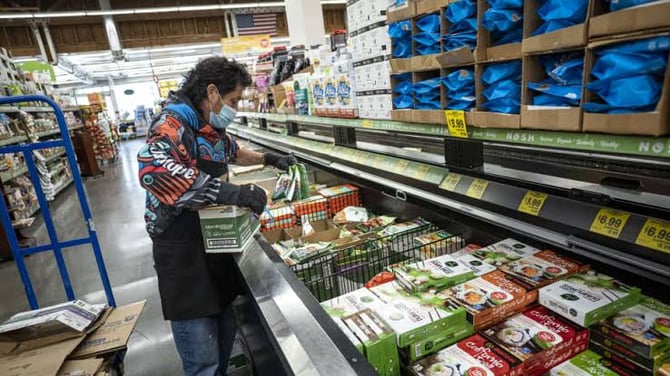Europe’s Economy Is Growing Again as Inflation Continues to Fall

The euro-area economy is growing again. Gross domestic product across the 20 countries that share the euro currency rose by 0.3% in the second quarter, compared with the previous three months.
GDP in the euro area had fallen by 0.1% in the last three months of 2022 and stagnated in the first quarter of this year.
The overall rate of inflation continued to fall this month. The consumer price index for the euro area rose by 5.3%, down from 5.5% in June.
The euro-area economy was hit hard last winter by the considerable increase in energy prices that followed Russia’s invasion of Ukraine — but data from Europe’s two biggest economies last week signaled that a recovery was already underway.
The shock from Russia’s invasion of Ukraine is fading. Sky-high prices for energy and food had hit consumers hard, but as inflation recedes while employment continues to rise and wage growth firms, real disposable incomes of households look set to strengthen in coming quarters.
What does this mean for me?
France’s GDP grew by 0.5% in the second quarter, compared with the first quarter of this year, beating economists’ expectations. Germany stagnated last quarter, but that was a modest improvement from the previous six months when Europe’s biggest economy was stuck in recession.
The European Central Bank raised the benchmark interest rate in the euro area by a quarter of a percentage point to 3.75% last Thursday, the central bank’s ninth consecutive hike.
However, ECB President Christine Lagarde told journalists she was considering a pause in hiking rates at the central bank’s next meeting in September
More News
.webp)
Canada Shields Steel and Lumber Industries From Tariffs
6 hours ago

Trump Drops Selected Tariffs in Response to Inflation Pressures
2 days ago

Tariffs on Mexico Test Nuevo Leon’s Industrial Momentum
6 days ago

US Moves to Ease Latin American Tariffs as Food Inflation Mounts
1 week ago

Japan Faces First GDP Shrinkage in Six Quarters as Tariffs Bite
1 week ago

India’s Inflation Dip Strengthens Case for RBI Easing
2 weeks ago

Europe Rallies as Shutdown Eases, Earnings Impress
2 weeks ago

Germany’s Trade Surplus Slides as Imports Outpace Exports
2 weeks ago